Israel at War: What happened on Day 74?
Israel's dismantling Hamas infrastuctrure in Gaza • Top Hamas financier killed in Gaza airstrike
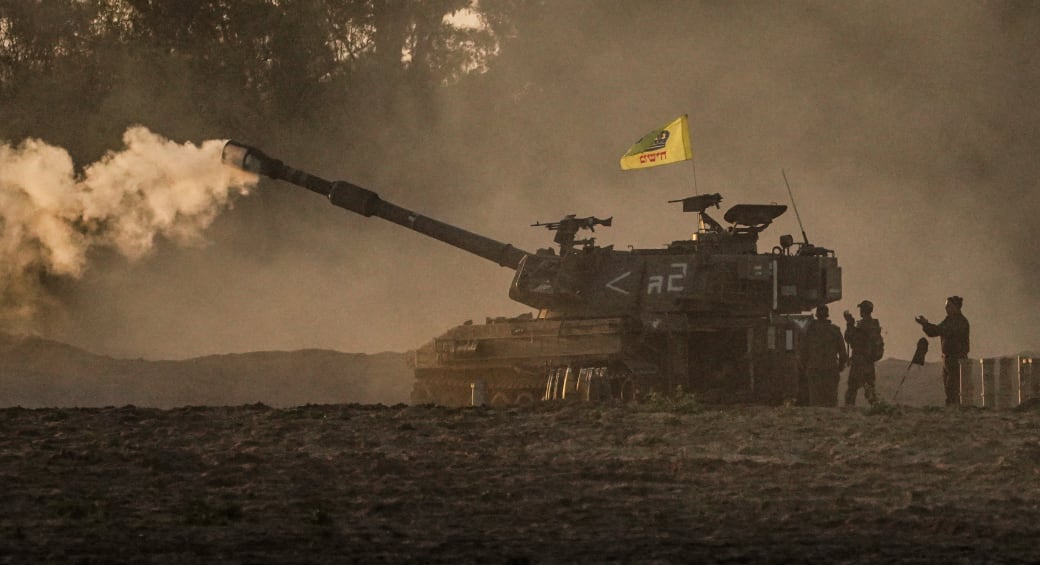
Israel's big political earthquake is coming after Hamas war - analysis
The colossal catastrophe of October 7 has made a tectonic shift in the country’s political landscape all but certain.
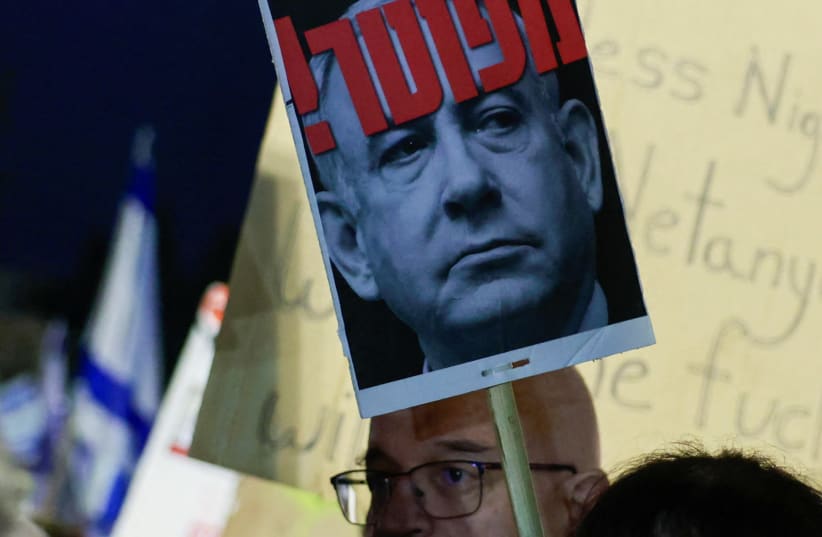
Israel is on the verge of a political earthquake.
Like all earthquakes, you don’t know exactly how it will unfold or when it will hit, but you know it's coming. The colossal catastrophe of October 7 has made a tectonic shift in the country’s political landscape all but certain.
Common sense dictates this conclusion, historical precedent affirms it, and the polls show its inevitability.
One need not be a brilliant sociologist to feel that something dramatic has changed in Israeli society. The Israel of December 20 is not the Israel of October 6 -- everyone realizes that. Its self-confidence has been hit, its sense of security has been dented, and its trust in its political and military leaders has been shattered.
The country is hurting, worried, and angry. There is a burning hatred toward Hamas, and there is seething anger toward the government -- how could this have happened? How could Israel have failed so miserably?
One indication of the whirling anger is the reluctance of government ministers and Knesset members to make public appearances. There are not a lot of high-profile politicians visiting the injured in hospitals or even attending funerals these days -- things very common in the past -- because of concern about the reactions they will meet.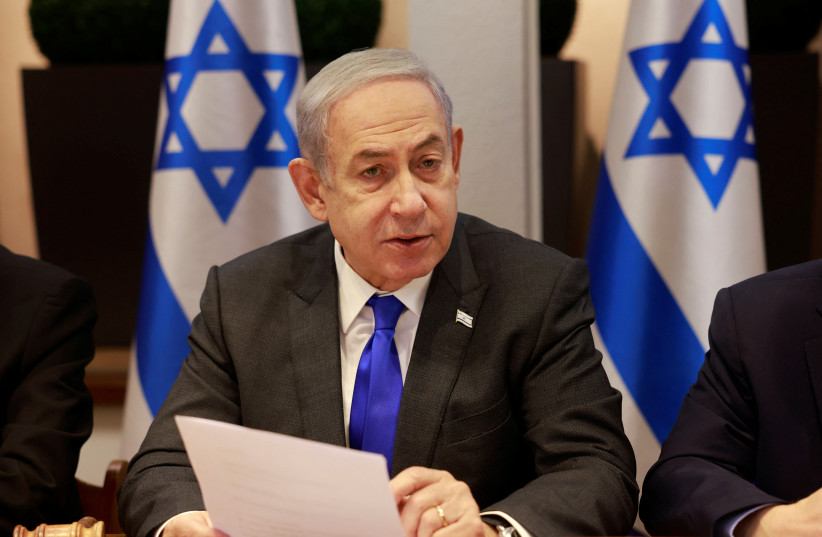
It will be impossible for the government -- for Prime Minister Benjamin Netanyahu -- to ignore this anger; anger that will inevitably erupt into a flood of protests and demonstrations when the reservists return from Gaza and the intensity of the fighting in Gaza wanes.
Netanyahu was asked at one of his recent press conferences whether he would step down after the war. He answered, as he does when asked these days any question about politics, that he is now preoccupied with waging the war, and not thinking about politics. And then he added that he received a mandate from the public to govern.
That mandate was from pre-October 7, Israel. Post-October 7, Israel will demand a chance to repeal or reaffirm that mandate.
The possible precedent to Israel's future
Israel has been here before, which is why it is safe to say that a political earthquake is on its way.
In October 1973, Israel faced a similar catastrophe -- the Yom Kippur War -- which upended society, causing burning anger and frustration. In the elections held just two months after the war -- elections that were postponed during the war -- the ruling Labor-led Alignment of Golda Meir -- the party that had dominated the country’s politics since its founding -- lost five seats and Menachem Begin’s Likud picked up seven.
Meir resigned a few months later after the interim findings of the Agranat committee were released, and Yitzhak Rabin was elected Labor Party leader, taking over as prime minister. The government fell two years later, and then in 1977, the country -- still traumatized from the Yom Kippur War and seething from the failures of the government and military leaders in the run-up to the Yom Kippur War -- went back to the polls.
In that election, the Alignment lost a whopping 19 seats, Menachem Begin’s Right-wing Likud picked up four, and a political realignment swept over Israel, a political realignment that has held -- with a few brief intervals of Left-wing governments -- for most of the last half-century.
It is fair to say that the failure of October 1973 helped usher in Begin and the Likud control of politics for much of the next 50 years. In the same sense, it is fair to predict that the failure of October 2023 will lead to the end of Likud’s long grip on power.
The October 7 massacre will definitely not be pushing the country to the Left, in any way similar to the Yom Kippur War and the failure of the left-wing government pushed the country into the arms of the Likud and the Right. But it will lead to something different. The country’s political constellation will change, even if the Right-Left balance is unlikely to change significantly. There will be a shifting of chairs on the Right, Left, and center decks, even though the overall size of those decks is unlikely to change significantly
What is likely to change, however, is the stars in the political constellation. Much of the polling these days, polling showing that Benny Gantz’s National Unity is far ahead of any of the current parties in the Knesset, is asking respondents who they would vote for based on the existing parties.
And when asked in this way, Gantz’s party soars, Likud and Yesh Atid fall precipitously, as does the Religious Zionist Party, while Yisrael Beiteinu adds seats, and Otzma Yehudit, the Arab parties, and the haredi parties remain pretty stable.
But that is when those queried are asked about the current parties. But there will be other parties in the mix the next time around.
First of all, Gantz’s party -- which is averaging about 39 seats in the major polls, as opposed to Likud’s 18 -- is expected to split in two, with Gideon Sa’ar’s New Hope party, which joined Gantz in the last election, widely expected to split off and run as a liberal right-wing party, perhaps with former prime minister Naftali Bennett. Such a party would put a big crimp in Gantz’s numbers.
Secondly, there will be other parties as well: former Mossad head Yossi Cohen may lead a party, and Meretz’s Yair Golan, whose stock rose considerably following his courageous actions during the October 7 fighting, may lead a unified left-wing party. There is also talk of a party being formed from the leaders of the anti-judicial reform protest movement.
The parties contesting the election next time will be quite different from the line-up the last time around.
With the current Netanyahu government coming up to only its first-year anniversary on December 29, some Likud stalwarts may be saying, “What is all the talk about new elections, we still have three years to go?”'
But to think the current government and Netnyahu can withstand the public’s anger and frustration and last out its term, or even come close to lasting out its term, is indulging in tooth fairy-like wishful thinking.
An Israeli Democracy Institute poll on Tuesday shows that just over two-thirds of the public (69%) thinks that new elections should be held immediately after the war. While it is obvious that those on the Left and in the Center would like to see immediate elections, what is surprising is that 51.5% of those who identify themselves as right-wing want to see new elections as well, showing the degree to which there is anger and a desire to see those responsible held accountable.
The only path to new elections now would be for the Knesset to dissolve itself as a result of the coalition losing its majority and unable to pass legislation.
There is, however, another way of bringing down the government, and that is through a constructive vote of no-confidence, whereby 61 MKs vote no confidence in the current government and agree on a new prime minister who would then be entrusted with the task of forming a new government. In this scenario, the government would change without the public going back to the polls.
Governments also fall in Israel if they are unable to pass a budget, something not relevant for the current government since it passed a two-year budget in May giving it a pass on this issue until 2025.
Some may look at the above options and say that there is no chance of new elections: the budget has already passed and the government is unlikely to dissolve itself.
Unless there is massive pressure from the grassroots for it to do just that -- something that given the current sour public mood is a real possibility.
According to the IDI poll, 44% of the population said they would take part in demonstrations if a wave of protests breaks out after the war to hold the political and military echelon responsible. Tellingly, 28% of Likud voters said they would participate in these demonstrations.
Those poll numbers indicate that much of the public will not, after the war, allow the Israeli political scene to return to what it was beforehand.
As Likud MK and Knesset Foreign Affairs and Defense Committee head Yuli Edelstein said in a Yediot Ahronot interview on Friday, “'I don’t think that everyone in the political system internalized the magnitude of the event -- October 7 changed everything in the country, but this sentence has not been entirely internalized.”
According to Edelstein, anyone who thinks that things will return to business as usual after the war is mistaken. “I truly believe business will not be as usual,” he said. “Not in the Knesset, and not in politics in general.'
A political earthquake is on its way. The question is not if; the question is when.
Go to the full article >>Most Israeli Jews think Israel should only lightly consider Gazans in war - poll
Almost two thirds of Israelis do not believe that Israel has a clear plan for the Gaza Strip for after the war.
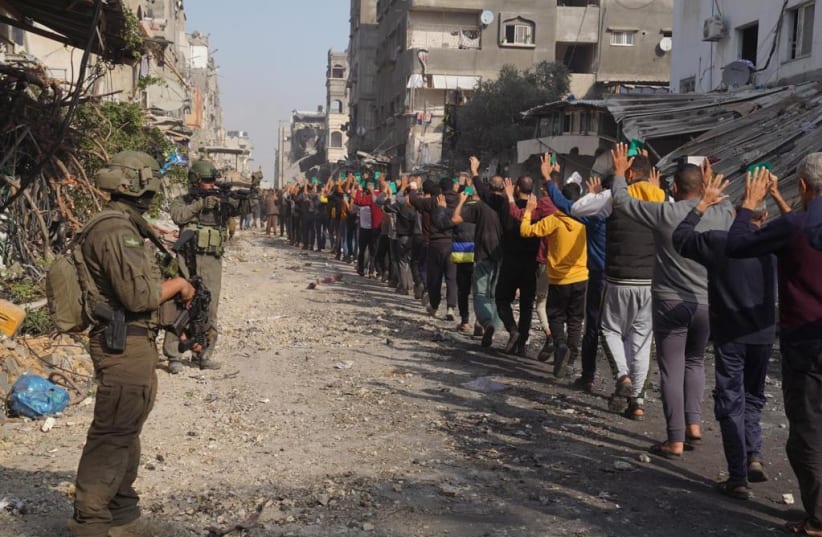
More than 80% of Israeli Jews believe that the suffering of civilian Gazans should only be taken into account to a small extent when Israel plans the continuation of the war, according to a poll published by the Israel Democracy Institute on Tuesday.
In complete opposition, 83% of Israeli Arabs believe that Gazans should be taken into account to a large extent.
Meanwhile, a whopping 91% of Jews believe that the IDF is making an effort to follow international laws in its fighting as opposed to only 24% of Arabs who believe the same. Another two thirds of Arabs believe that the IDF isn't trying at all.
Since October 7, there have been many protests across the world accusing Israel of genocide and committing war crimes in Gaza.
The respondents in the survey were asked whether this was down to antisemitism and hatred of Israel or the number of civilian casualties and the extent of the destruction in Gaza. Just under two thirds of Jews said it was down to antisemitism, while 52% of Arabs said it was the latter.
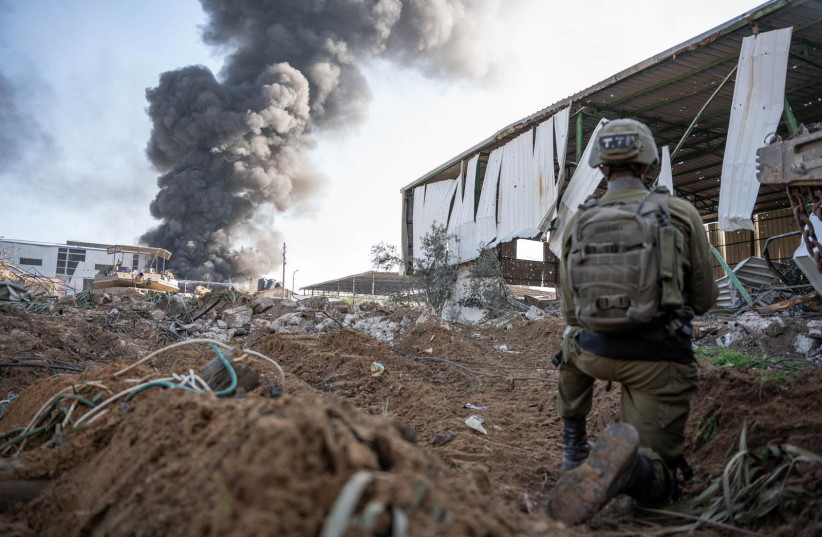
Another possible reason for the anti-Israel opinions could be the difference in public relations utilized by Israel and Hamas. While the latter is known to have a very active (and not entirely truthful) PR campaign, Israel scored low in the poll in this respect with 72% of Jews and almost 80% of Arabs saying that Israel's PR is poor or so-so.
PR aside, Israel set two main goals in the war: Destroying Hamas and bringing home the hostages. About two thirds of respondents think the former is possible, while only 35% think the hostage goal will be achieved.
As for what happens in Gaza after the war, almost two thirds of Israelis do not believe that Israel has a clear plan for the Gaza Strip for after the war.
While Prime Minister Benjamin Netanyahu has clearly said many times that Israel won't resettle it and that the Palestinian Authority will not be given control, Israelis have yet to be presented with any potential plans.
Majority of Israelis believe elections are necessary after war
If the survey is anything to go by, however, Israel can expect to undergo elections after the war with 69% believing they would be necessary.
The constituents who most supported elections after the war were Ra'am's (97%), while the least support came from United Torah Judaism constituents (29%).
Almost half of Likud voters also believed that elections should be held after the war despite their party falling drastically in polls since the beginning of the war, going from 32 seats in last year's election to 18 in the latest poll that was published by N12 on Monday.
The Religious Zionist Party, which couldn't even cross the threshold in Monday's poll also had support for elections after the war from almost half of its constituents.
Go to the full article >>Gallant: Hamas leaders are headed either to prison or the cemetery
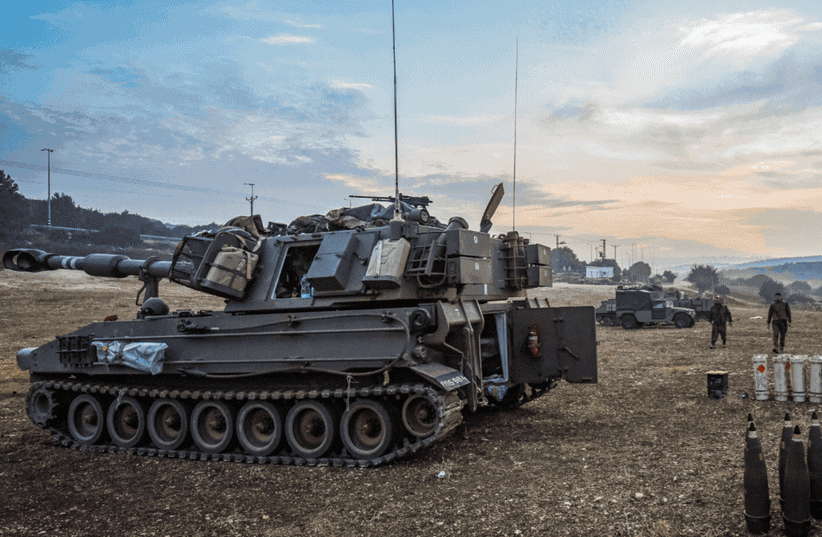
Defense Minister Yoav Gallant stressed that Israel would bring senior leaders of Hamas "to the place they deserve - either the cemetery or prison" during a situation assessment along the Gaza border on Tuesday.
"In the north of the Gaza Strip - the operation is focused on final clearing of the Gaza area and entering underground into tunnels at great depths where we find great catches and bring it to us," said Gallant.
"In the south of the Gaza Strip - Khan Yunis has become the new capital of terrorism. We are working there, focusing our efforts, the operation will cross stages, and will continue until we reach our goals, we will not let up. We will bring the senior officials of the murderous organization to the place they deserve - either to the cemetery or to the prison."
Go to the full article >>IDF sources: Dismantling Hamas in southern Gaza may extend into ‘Stage 3’
“Stage 3” refers to a point where the “main war” is over, but where the IDF is expected to continue for three to nine months to fight an insurgency.
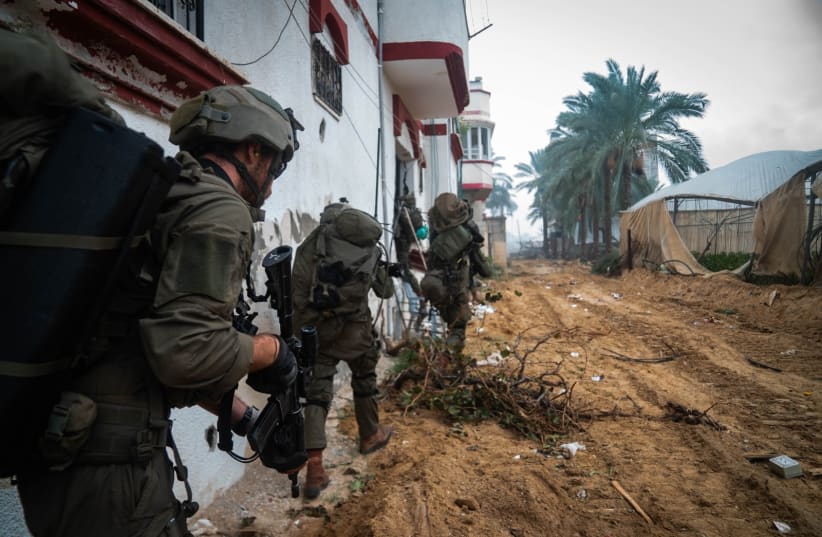
Dismantling Hamas in southern Gaza may need to extend into “Stage 3” of Israel’s plans for Gaza, IDF sources have said.
“Stage 3” refers to a point where the “main war” is over, but where the IDF is expected to continue for three to nine months to fight an insurgency.
The IDF continues to make consistent progress in Khan Yunis over the last few weeks and has relative control in southern and eastern Khan Yunis and nearby Bani Suheila, but is facing heavy resistance in other parts of Khan Yunis.
Also, the IDF has struck Hamas positions in Rafah from the air, but has not started to invade the area in a serious way with ground troops.
Slowing down the war?
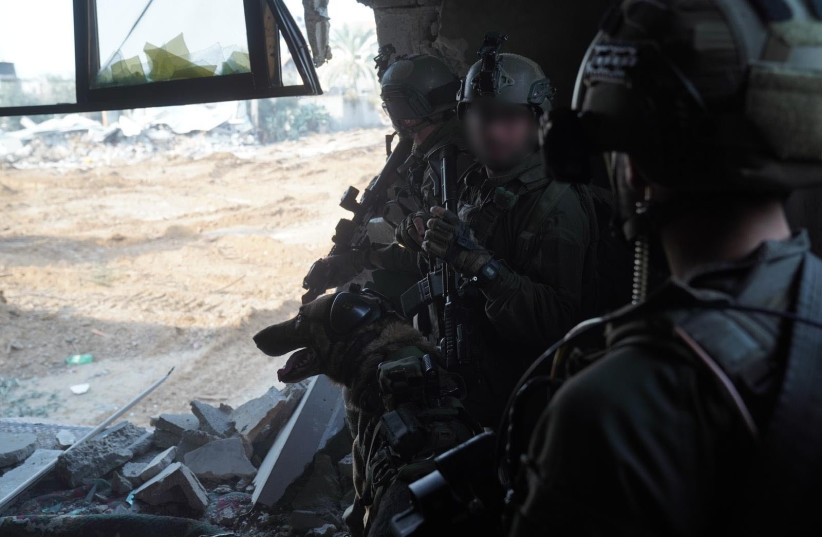
In the meantime, top Israeli officials have been saying since last month that they would conclude the most intense part of the war by the end of January – which already is some weeks later than the US prefers, and much later than Israel’s EU allies prefer.
Ending the main war means allowing much of the reservist force to return home to their families, moving toward restoring a fully functioning Israeli economy, and relieving the pressure on the Jewish state globally to avoid operations which harm Palestinian civilians.
But top defense officials are starting to recognize that moving at the slower and more careful pace they are moving at to reduce both Palestinian civilian casualties and IDF troops may mean that Khan Yunis, Rafah, and some other southern Gaza areas may not be fully subdued by the end of January.
War minister Benny Gantz implied as much on Tuesday when he said that aspects of the IDF's fighting in Gaza would continue into "Stage 3," beyond the main war.
This could be doubly true if the IDF does not figure out a way to thread the needle of mounting an attack on the hideout of Gaza’s two chiefs Yahya Sinwar and Muhammad Deif, without such an attack leading to Hamas killing the remaining Israeli hostages.
If main war ends, IDF may need to continue more intense levels of conflict
In such a scenario, even if northern Gaza is under full IDF control when the main war ends, the IDF may need to continue more intense levels of conflict in portions of southern Gaza.
Such a move would potentially mean fighting with fewer reserve forces and reduced air and artillery power so as to lessen both Palestinian civilian casualties as well as potential destruction of Gaza’s general landscape.
The idea would be more targeted anti-terror operations as in the West Bank, which would have a smaller military footprint and would draw less global scrutiny.
One problem that Israel may encounter in continuing fighting at such reduced levels is IDF sources emphasizing that Hamas has placed weapons virtually everywhere so that its terror forces can move around in public unarmed and without drawing IDF suspicions.
Fighting such tactics is hard enough in any situation, but doing so with less air support to be able to track and fire on traveling Hamas operatives at all times, could be extraordinarily difficult and further draw out the fighting.
Israel would still hope to wrap up such fighting within three to nine months in order to move on to handing Gaza over to new management – whose identity is still being hotly debated.
The Palestinian Authority, some new group of local Gazans not affiliated with Hamas, the UN, moderate Sunni Arab countries, Israel’s Western allies, and some hybrid of these options are all being discussed.
Go to the full article >>Egypt, US agree to work to prevent displacement of Palestinians - Egyptian foreign ministry

Egypt and the United States have agreed to work by all means to prevent displacement of Palestinians from their lands, the Egyptian foreign ministry said on Tuesday.
The ministry added that Egypt had urged the US to support the UN resolution on humanitarian aid for Gaza.
Go to the full article >>Egypt, US agree to work to prevent displacement of Palestinians - Egyptian foreign ministry

Egypt and the United States have agreed to work by all means to prevent displacement of Palestinians from their lands, the Egyptian foreign ministry said on Tuesday.
The ministry added that Egypt had urged the US to support the UN resolution on humanitarian aid for Gaza.
Go to the full article >>Israel ready for Gaza humanitarian pause, release of hostages - Herzog
Herzog urged the ambassadors of countries that have been supportive of Israel to urge their governments to do more in appealing to Qatar to influence the immediate release of hostages.
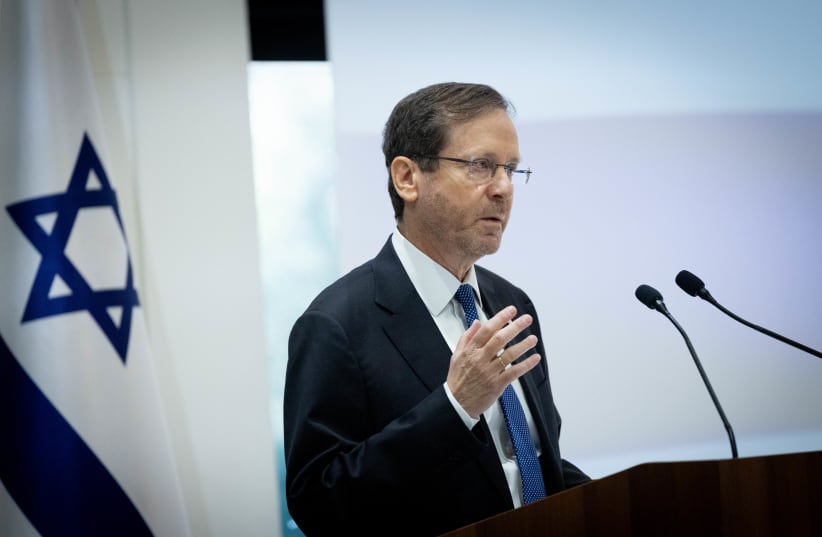
Israel is prepared to hold another humanitarian pause in Gaza to advance the release of more Gaza hostages, President Isaac Herzog told heads of foreign diplomatic missions at a briefing on Tuesday.
Herzog, joined in the briefing at the President’s Residence by COGAT’s Civil Department head, Col. Elad Goren, said that bureaucracy is stifling humanitarian aid to Gaza’s civilian population.
He said the number of trucks passing through daily could easily be tripled if bureaucratic differences with Israel’s partners could be resolved. Herzog added that he had personally inspected some of the products being sent into Gaza and found them lacking quality. He asked the ambassadors of all the countries that supply humanitarian aid to Gaza to ask their governments to improve the quality.
He also urged the ambassadors of countries that have been supportive of Israel to urge their governments to do more in appealing to Qatar to influence the immediate release of hostages.
There are still 129 hostages in Gaza from both Israel and other nations – primarily Thailand.
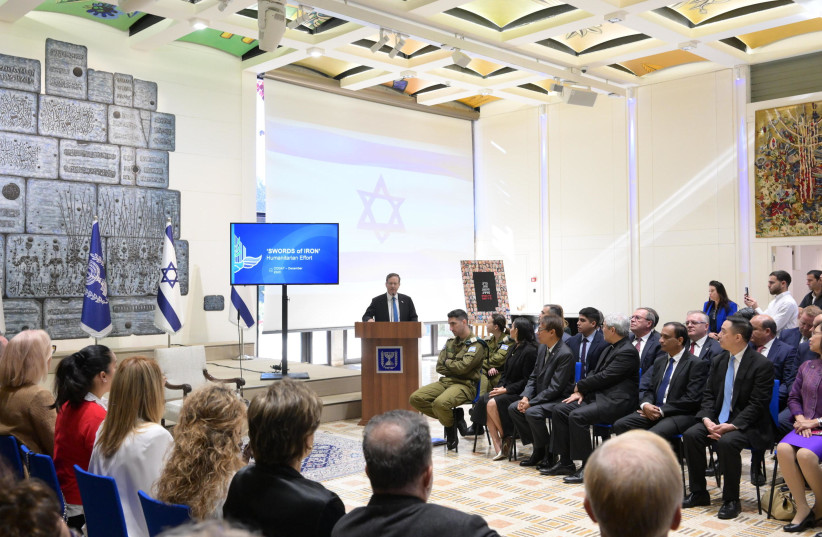
Thai ambassador Pannabha Chandraramya was almost in tears as she told The Jerusalem Post that she was praying for Thai nationals to be released before the New Year. There was no logic in keeping them captive, she said, because Thailand has no part in the Middle East conflict and has diplomatic relations with the Palestinian Authority.
Herzog emphasized that it is essential to bring home the hostages as soon as possible.
Referring to the video released by Hamas on Monday, in which it showed that some of the more senior hostages are still alive, Herzog noted that the hostages in question were aged 80 to 85, and the fact that they had not yet been released was further evidence of the sadistic approach of Hamas.
Herzog persisted in calling for the family of nations to impress upon Qatar the importance of releasing the hostages immediately. As for humanitarian aid, both Herzog and Goren stressed that Israel is not at war with Gaza. Israel is at war with Hamas.
Relating to the civilian population of Gaza, Herzog said: “They are not our enemies. Hamas is our enemy.” Israel is doing its utmost to evacuate Gaza’s civilian population from dangerous areas and to build shelters, he continued. This is often done at high risk to Israeli soldiers and civilians because once it is known that a particular area in Gaza will not be targeted by Israeli forces, Hamas moves in and fires rockets from there at Israel.
Herzog also spoke of the post-traumatic effect on some 230,000 Israelis who have been evacuated from their homes and have no idea when they will return.
Herzog: Israel doing everything to provide more aid to Gazans
Although Israel has been criticized on issues related to humanitarian aid for Gaza, Herzog insisted that Israel is doing everything possible to provide more humanitarian aid “because it’s the right thing to do.”
Moving into the hypothetical realm, Herzog said that everyone is talking about the day after because no one knows who will manage Gaza. “If there is a horizon of peace between Gaza, Israel, and the Palestinians, we have to think big and turn Gaza into a place of peace and not a place of war,” he said.
As he has done previously, Herzog explained that the war with Hamas is not just between Hamas and Israel. “This is a war between the forces of evil and the whole world order. It’s a war with major worldwide implications.”
Goren spoke about medical support, international coordination, and operational measures on the ground inside Gaza.
There is a humanitarian task force that monitors needs in Gaza, plus a medical response team that includes representatives of the United Nations and international agencies who meet on a daily basis, he said.
Endorsing Herzog’s comments about the possibility of increasing humanitarian aid, Goren said that 200 trucks are checked daily. “We can do better,” he declared. “We can have 359-400 trucks a day.”
This is not a sudden ambition. “At the beginning of the war, we understood that humanitarian aid is a vital issue,” said Goren. “Hamas doesn’t care about humanitarian aid. We are trying to increase the volume not just to Gaza, but in Gaza.”
Israel has been working with France and Italy to evacuate the sick and infirm and have them sent to French and Italian hospital ships.
The ships of other countries are in the pipeline, said Goren. There are also plans to put up field hospitals in Gaza, and in this respect, Israel is working together with the United Nations, the United States, and the Egyptians “to make sure we are all speaking the same language.”
Go to the full article >>Any country that moves against Yemen will have its ships targeted - Houthi official

Any country that moves against Yemen will have its ships targeted in the Red Sea, Mohammed Ali al-Houthi, a member of the Supreme Yemeni Political Council, told Iranian Al-alam TV on Tuesday.
Go to the full article >>
IDF announces name of soldier who fell in northern Gaza

IDF Sgt. First Class (ret.) Maoz Fenigstein, 25, from Susya, fell in battle in the northern Gaza Strip, the IDF Spokesperson's Unit said on Tuesday evening.
Fenigstein served in the 7008th Battalion of the 551st Brigade.
Go to the full article >>Pope: Israelis, Palestinians face Christmas 'of pain and mourning'
Pope Francis has called several times for an immediate ceasefire in Gaza and for the release of all hostages taken by Hamas.
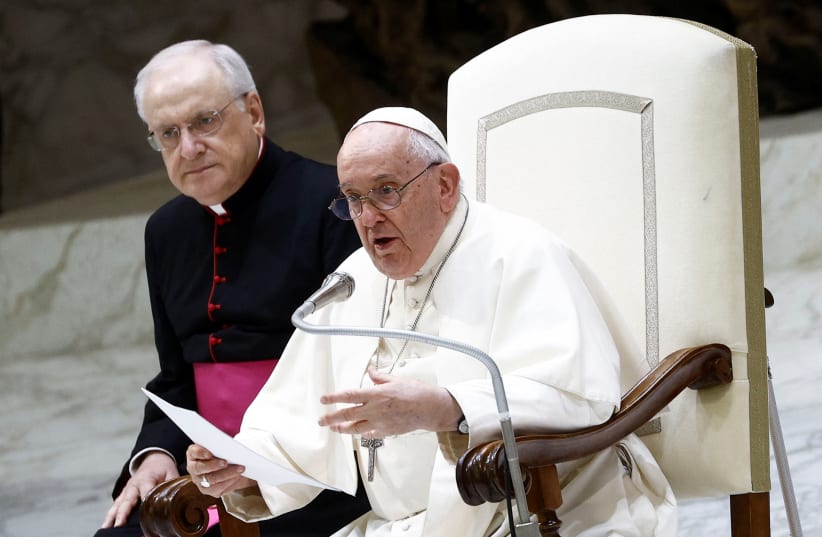
Israelis and Palestinians face "pain and mourning" over the Christmas period as the war in the Gaza Strip rages on, Pope Francis said on Tuesday, calling for prayers and "tangible aid" for the devastated enclave.
"For the inhabitants of the Holy Land, a #Christmas of pain and mourning looms. We do not want to leave them alone. May we stand by them in prayer and tangible aid..." Francis wrote on social media platform X.
For the inhabitants of the Holy Land, a #Christmas of pain and mourning looms. We do not want to leave them alone. May we stand by them in prayer and tangible aid. The suffering of Bethlehem is an open wound for the Middle East and the entire world.
— Pope Francis (@Pontifex) December 19, 2023
Israel's campaign to eradicate Hamas terrorists behind an Oct. 7 incursion and massacre of 1,200 people has left Gaza in ruins, brought widespread hunger and homelessness, and killed nearly 20,000 Gazans, the enclave's health ministry says.
Pope Francis called for ceasefire multiple times
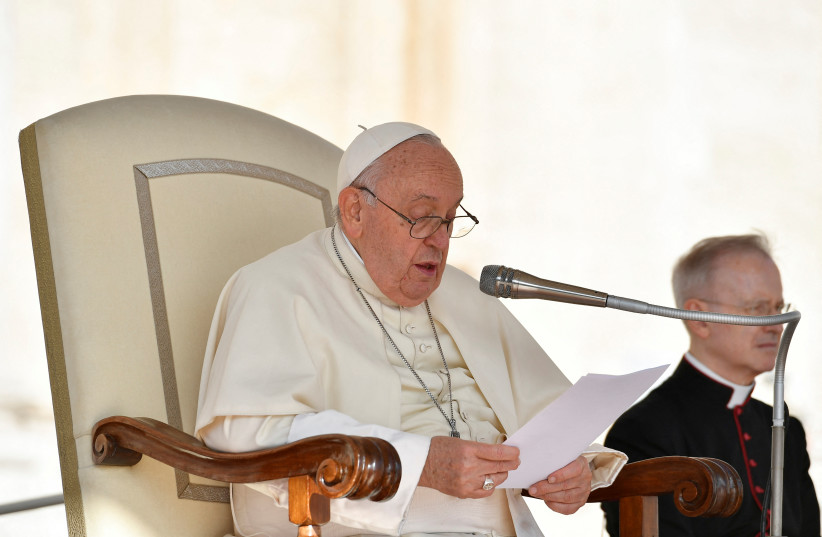
Francis has called several times for an immediate ceasefire in Gaza and for the release of all hostages taken by Hamas.
On Sunday, he suggested Israel was using "terrorism" tactics in the Palestinian enclave, deploring the reported killing by the Israeli military of two Christian women who had taken refuge in a Catholic church complex.
Go to the full article >>Israel-Hamas War: What you need to know
- Hamas launched a massive attack on October 7, with thousands of terrorists infiltrating from the Gaza border and taking some 240 hostages into Gaza
- Over 1,200 Israelis and foreign nationals were murdered, including over 350 in the Re'im music festival and hundreds of Israeli civilians across Gaza border communities